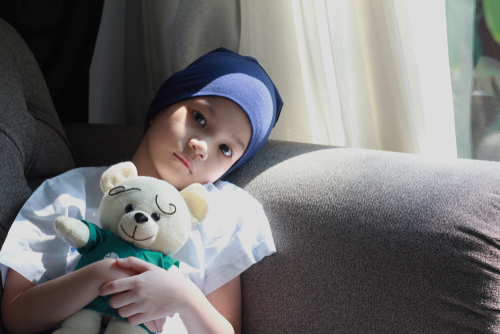Addition of nelarabine to chemotherapy benefits young people with T-ALL
M3 Global Newsdesk Jul 17, 2018
Treatment with nelarabine adds to disease-free survival in children and young adults with T-cell acute lymphoblastic leukemia (T-ALL), according to an abstract presented at the 2018 ASCO Annual Meeting in Chicago, IL.

“T-cell ALL is a disease that requires the use of a very intense and complex chemotherapy regimen,” according to lead author Kimberly Dunsmore, MD, Virginia Tech Carilion School of Medicine and Research Center, Roanoke, Virginia. “Historically, about 80% of people live at least four years after being treated for their disease, but we felt we could and must do better. Our trial shows that we could further increase survival rates by about 10%, which is very encouraging.”
Nelarabine is T-cell specific, and was approved by the FDA in 2005 for patients who failed two or more chemotherapy regimens. In this federally-funded, randomized phase 3 clinical trial performed by the Children’s Oncology Group (COG), Dr. Kunsmore and colleagues evaluated the safety and efficacy of nelarabine when it was included in COG-augmented Berlin-Franklin-Munster (COG aBFM) chemotherapy in patients who were newly diagnosed with T-ALL and T-cell lymphoblastic lymphoma (T-LL).
The team randomized patients to four arms, with each arm administered COG aBFM, a standard, complex, multi-drug chemotherapy. The sample size for this study was 1,895, making it the largest randomized clinical trial to date in patients with T-cell cancers. They included patients between the ages of 1 and 30 years, with 94% diagnosed with T-ALL and 6% diagnosed with T-LL.
The researchers randomly assigned participants to receive either inpatient high-dose methotrexate chemotherapy or outpatient escalating-dose methotrexate chemotherapy. Patients at moderate- or high-risk of recurrence were randomly assigned to receive nelarabine, as well as chemotherapy and cranial radiation for brain metastases.
Results showed that 84.3% of participants showed no signs of cancer at 4 years, and 90.2% of the patients in the trial lived a minimum of 4 years. Notably, these survival rates are the highest yet recorded for the treatment of T-cell cancers.
Treatment with nelarabine in those patients at higher risk of recurrence resulted in 88.9% of patients being leukemia-free at 4 years, compared with 83.3% in those not administered nelarabine. However, patients with T-LL did not derive benefit from the addition of nelarabine.
Patients who received escalating doses of methotrexate outperformed those who received high-dose methotrexate, which runs counter to results of previous, smaller studies.
The researchers found that leukemia-free rates were highest among those patients receiving nelarabine and escalating doses of methotrexate (92.2% at 4 years).
Based on the results of this study, the researchers recommend that nelarabine “should become a new standard of care” for children and young adults with T-ALL. They suggest that future researchers could examine the efficacy of nelarabine in chemotherapies without cranial radiation, which poses serious adverse effects such as learning disabilities, neuroendocrine effects, and risk of secondary malignancy.
In an official statement, ASCO President, Bruce E. Johnson, MD, shed perspective on these findings: “As oncologists, we are constantly striving for better care and outcomes for our patients, even in cancers where survival rates are relatively high compared with others. We now know it’s possible to significantly boost survival in children and young adults with rare forms of leukemia and lymphoma, without introducing additional harsh side effects that can impair their quality of life.”
To read more about this study, click here.
This story is contributed by Naveed Saleh, MD, MS and is a part of our Global Content Initiative, where we feature selected stories from our Global network which we believe would be most useful and informative to our doctor members.
-
Exclusive Write-ups & Webinars by KOLs
-
Daily Quiz by specialty
-
Paid Market Research Surveys
-
Case discussions, News & Journals' summaries